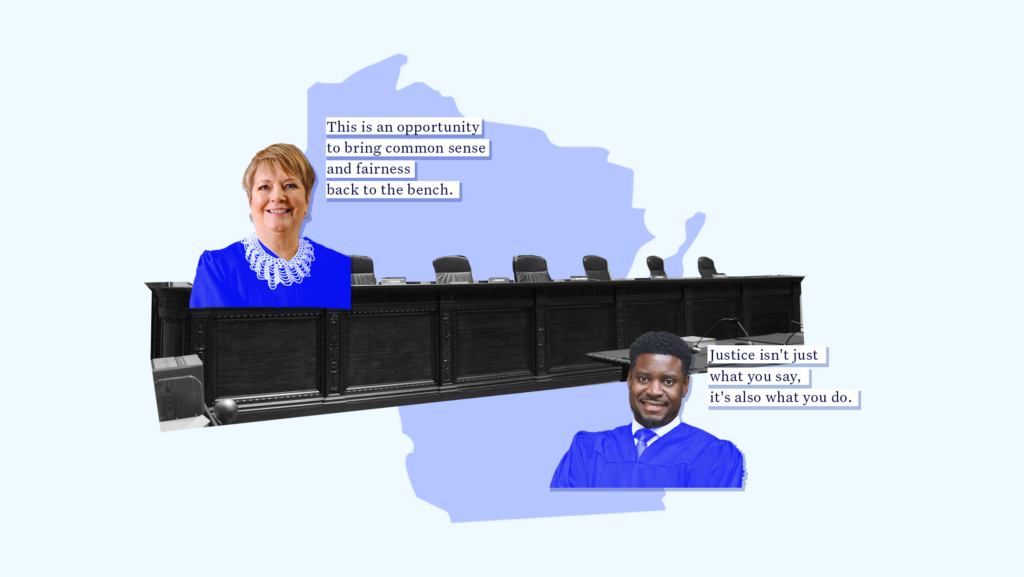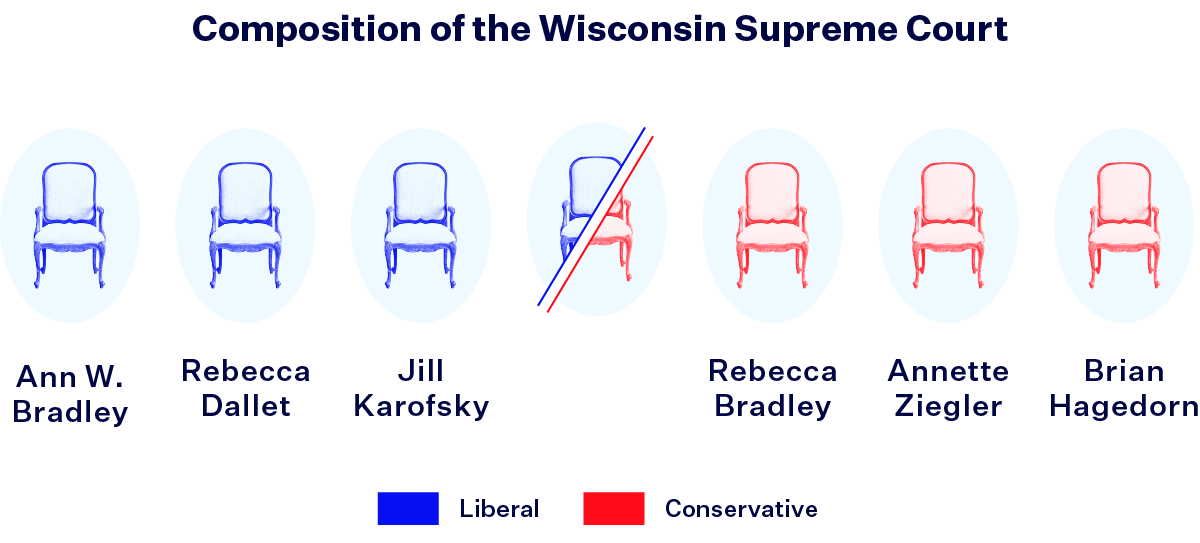Meet the Wisconsin Supreme Court Candidates Who Want To Protect Democracy

In any other moment, a spring, off-cycle election in a state Supreme Court race would receive scant national attention. Not this year and not in Wisconsin. Voting is already underway to elect the newest justice to Wisconsin’s highest court at a time when the role of state courts in protecting (or undermining) democracy is receiving renewed attention.
The Wisconsin Supreme Court currently has a 4-3 conservative majority, but Justice Patience Roggensack, one of the conservative justices, is retiring at the end of this term. Consequently, control of the court is on the line, and in a hugely important swing state like Wisconsin, everything from gerrymandering to abortion access may cross its docket. As a testament to the high stakes, this is expected to be the most expensive state Supreme Court election ever, with several million dollars already poured into the race from both sides.

On Tuesday, Feb. 21, voters will head to the polls for the nonpartisan primary election, which differs from partisan elections by not listing the candidates’ party affiliations on the ballot. The two candidates with the highest number of votes, regardless of party, will proceed to the general election; this means that the balance of the court could effectively be decided in the primary. The general election is scheduled for Tuesday, April 4.
Meet the liberal candidates: Janet Protasiewicz and Everett Mitchell
Wisconsin elects its Supreme Court justices to 10-year terms in technically nonpartisan elections, but Democratic and Republican machinery are whirring in the background to support the two liberals and two conservatives, respectively, in the race.
On the conservative side, Daniel Kelly is vying to regain a position on the state Supreme Court, which he held from 2016 (appointed by then-Gov. Scott Walker (R)) to 2020, when he lost his re-election bid. The other conservative, Jennifer Dorow, currently serves as a Waukesha County Circuit Court judge. She gained prominence after presiding over the trial of the man who killed six people with his SUV at a Christmas parade in December 2021. Both conservative candidates boast endorsements from sheriffs and Wisconsin anti-abortion groups.
The two liberals in the race are Janet Protasiewicz, a former prosecutor who has served as Milwaukee County Circuit judge for nearly a decade and Everett Mitchell, a judge in the Dane County Circuit Court, home to Madison.
Protasiewicz has been endorsed by Emily’s List and two current justices on the court. “Our system works because the law is predictable,” Protasiewicz wrote on her campaign website. “You can read the constitution, the statutes, and case law, and know what to expect, but as we can see on an almost-daily basis, our most closely-held constitutional rights are under attack by radical right-wing extremists.”
Mitchell is a juvenile court judge who is involved in community work. He has also implemented changes in the courtroom that research shows promote better outcomes for youth, for example, removing restraints and handcuffs on young defendants during hearings. Mitchell began that policy shift in his own courtroom before petitioning the Wisconsin Supreme Court to change those rules statewide, which it did.
“Justice isn’t just what you say, it’s also what you do,” Mitchell told Democracy Docket in a statement. “I’ve prided myself on…the action I’ve taken to make our communities safer and more responsive to the people.”
Recently, the Wisconsin Supreme Court has issued consequential rulings over the 2020 election, drop boxes and more.
In July 2022, the Wisconsin Supreme Court released a 4-3 opinion finding that both drop boxes and third-party ballot collection were not expressly authorized in Wisconsin law and thus were deemed illegal. The ruling originated from a case filed seven months after Wisconsin held a successful, high-turnout election in the midst of the COVID-19 pandemic. Justice Rebecca Grassl Bradley wrote the majority opinion and was joined by her three, fellow conservative justices.
Mitchell told Democracy Docket that he agreed that the use of unmonitored drop boxes — secure containers for voters to deliver mail-in ballots — was not consistent with Wisconsin statute, but added that there are other ways that local clerks could permit individuals to access drop boxes so that “communities can still participate in the voting process in easy and convenient ways.”
Protasiewicz, however, noted to Democracy Docket that she generally aligns herself with the dissenting opinion in the drop box case: “I believe the dissenting justices were correct to reason that a ballot drop box is an extension of the municipal clerk because it ‘is set up by the municipal clerk, maintained by the municipal clerk, and emptied by the municipal clerk.’ The dissenting opinion also correctly asserts that outlawing ballot drop boxes will severely disadvantage the voting rights of marginalized communities.”
This decision wasn’t the first time that the Badger State’s highest court weighed in on crucial voting and election cases. Immediately after President Joe Biden defeated former President Donald Trump in Wisconsin by over 20,000 votes, Wisconsin became a hotspot for anti-democratic efforts. In the post-election period, the Trump campaign filed a lawsuit seeking to invalidate thousands of votes cast in the Madison and Milwaukee areas. Protasiewicz highlighted this case; though the Wisconsin Supreme Court ultimately rejected that effort, Protasiewicz is “deeply concerned that only a bare majority stood in favor of a very, very simple reading of the law,” she told us. “Three out of seven justices would have overturned the results of the Presidential Election in Wisconsin and hand the state’s electoral votes to Donald Trump.”
Protasiewicz continued: “In 2016, Donald Trump won Wisconsin. Using the exact same electoral system, in 2020, Joe Biden won Wisconsin. The extreme, partisan right-wing justices who tried to overturn democracy in Wisconsin because they didn’t like the result should be ashamed of themselves.”
“Bending the rules so that the people can’t make progress:” Both liberal candidates push back against partisan gerrymandering.
Following the release of 2020 census data, the Wisconsin Supreme Court had to step in and adopt new legislative and congressional maps because the Republican-controlled Legislature and Democratic Gov. Tony Evers (D) could not agree on proposals. (The U.S. Supreme Court later got involved with the state legislative maps.)
Wisconsin is known for having some of the most gerrymandered state legislative maps in the country. In the 2010 redistricting cycle, Republicans drew partisan gerrymanders that created outsized majorities in the state Senate and Assembly. Then last year, the courts used a “least-change” approach (making as few changes as possible from the 2010 maps while complying with population requirements), so this skew became further entrenched.
When asked about this past redistricting cycle, Mitchell explained to us that “the Wisconsin Supreme Court’s decision to take a ‘least change’ approach to the maps was not fair to the people. Any time folks in power talk about ‘least change,’ they’re talking about cementing the status quo, bending the rules so that the people can’t make progress.”
Protasiewicz discussed a partisan gerrymandering case, Rucho v. Common Cause (2019), as an illustrative example for her belief that right-wing extremists are hijacking the courts: “The judges decided the case on their own discretion and by their own views,” she told us, “rather than on judicial principles and precedent, which allowed right-wing justices to encourage polarization and unequal political representation.”
The stakes are high for Wisconsinites and democracy across the country.
Protasiewicz explained the basic tenets of the Wisconsin judicial system: “[The Wisconsin Supreme Court] is not a trial court or fact finder or a political institution that uses a case to achieve a predetermined result without a firm legal basis. The Wisconsin Supreme Court should not be a political body, used for justices to impose their own view.”
The important role of state courts has often been overlooked, but the attention on this year’s race is markedly different. Both liberal candidates emphasize that there is a lot at stake during this race: “A woman’s right to make their own personal decisions about their healthcare,” Mitchell listed. “Wisconsin’s democracy is at stake.”
Protasiewicz reiterated how important fair representation is to her as well: “Our democracy is one of our closely held ideals and that needs to be valued.”